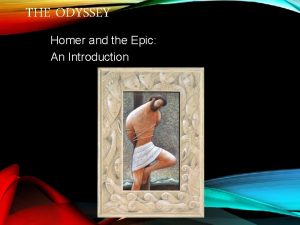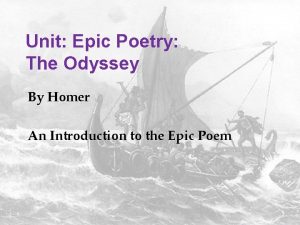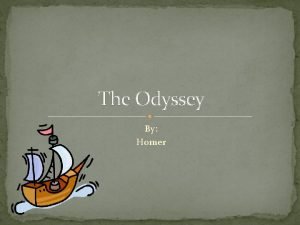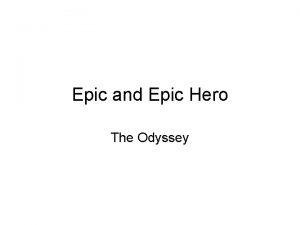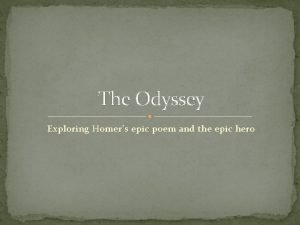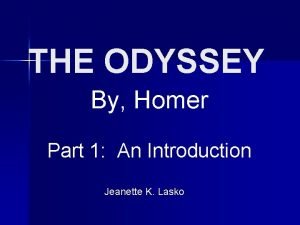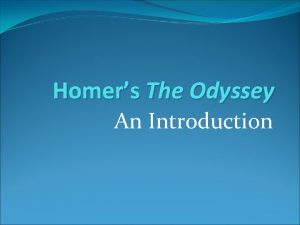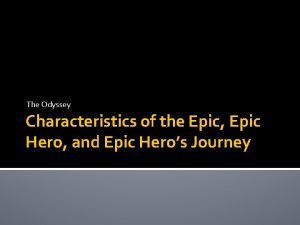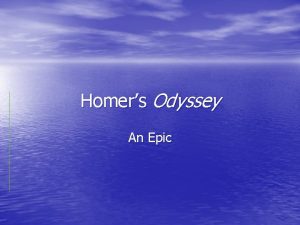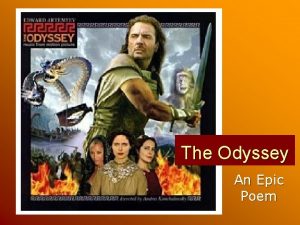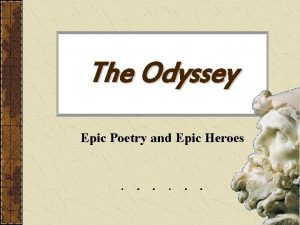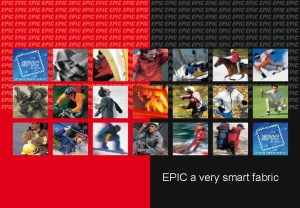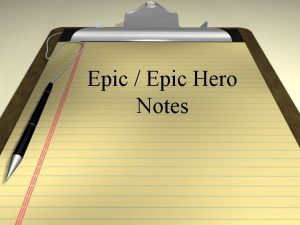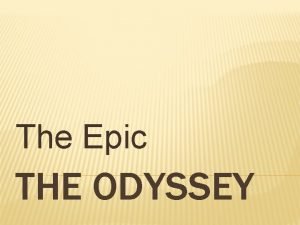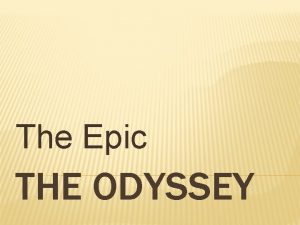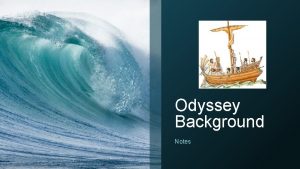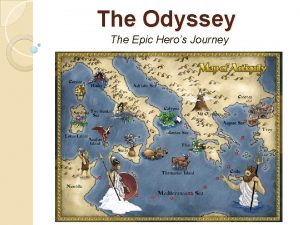The Epic of The Odyssey Epic Traits An









- Slides: 9

The Epic of The Odyssey

Epic Traits • An Epic is a long narrative poem • We learn everything important about cultural values of that culture from epics • Epics embody who we are and what we should be, similar to a literary mirror • The story of life itself • Large and ambitious projects

2 kinds of Epic According to C. S. Lewis • Primary Epics generally anonymous-arose in cultures that do not rely primarily on literacy or writing (oral tradition). • Examples-The Iliad, The Odyssey, and Beowulf. • The Bard must call on his resources when telling the tale: Repetitious sequences, epithets, and fragments that fit inside the poetic meter/formula to help bards tell the tales • He works the same way as an improvisational musician (live concerts vs a cd) given the audiences interests.

2 kinds of Epic According to C. S. Lewis • Secondary Epics make up the vast majority of epics-has an author that wrote and published the epic (no oral tradition) they are in response to the primary epic • Written in verse-Aeneid, Dante’s Inferno, and Paradise Lost.

Epic Hero traits • Embodies ideals and values that the culture admires • Larger than life figure who undertakes great journeys • Possesses super human strength, craftiness, and confidence • Helped or harmed by interfering gods • Emerges victorious from perilous situations

Odysseus • Known for his multifacetedness and polytropos—being resourceful and able to approach a problem from many vantage points. He has not only strength, but cunning, leadership, and military skill. • Greek cultural self-portrait of what it means to be Greek. • Odysseus also plays the role of bard or poet telling his story. —Remember that Odysseus is a master of cunning and deceit which begs us to figure out if he is telling the truth of what happened to him and his crew. How is he the only survivor? He says that monsters ate/killed them; funny how those monsters only show up when he’s telling the story and the rest of the story is more natural.

Super Important Epic Conventions • Epic Simile-a simile that tells a story for several lines within its comparison. Begins with “as” and ends with “so…” • Epithet-adjectives that describes a person or thing • Medias Res-in the middle of things (The Odyssey begins in the middle of the story and then is told with flashbacks) • Hubris-excessive pride (Odysseus’ flaw) as • Simile: “then, doves or thrushes beating their spread wings against some snare rigged up in thickets—flying in for a cozy net but a grisly bed so receives them— the women’s heads were trapped in a line, nooses yanking their necks up, one by one so all might die a pitiful, ghastly death” (lines 494 -498) • Epithets: Dawn with her rose red fingers • wine-dark sea • clear-eyed goddess

Arête: Virtue of Excellence • Something all Greek people strive to have • Odysseus can do anything that is called upon him. • Penelope is also the perfect picture of a wife. • The swineherd, Eumaus, and Penelope’s maid, Eurycleia, are valuable and loyal persons of excellence. • Argos, Odysseus’s dog, is the best dog.

More Epic Conventions Epic Plot Epic setting • Strange creatures • Includes fantastic or exotic lands • Divine intervention • Involves more • Large-scale events than 1 nation • Treacherous weather
 Who was homer
Who was homer Famous epic poem by homer
Famous epic poem by homer The odyssey and epic poetry an introduction part 1
The odyssey and epic poetry an introduction part 1 Hero of the odyssey
Hero of the odyssey Homers epic poem
Homers epic poem An introduction to the odyssey by david adams leeming
An introduction to the odyssey by david adams leeming The odyssey and epic poetry an introduction part 1
The odyssey and epic poetry an introduction part 1 Epic hero characteristics in the odyssey
Epic hero characteristics in the odyssey Is odyssey an epic
Is odyssey an epic Why is the odyssey an epic poem
Why is the odyssey an epic poem
